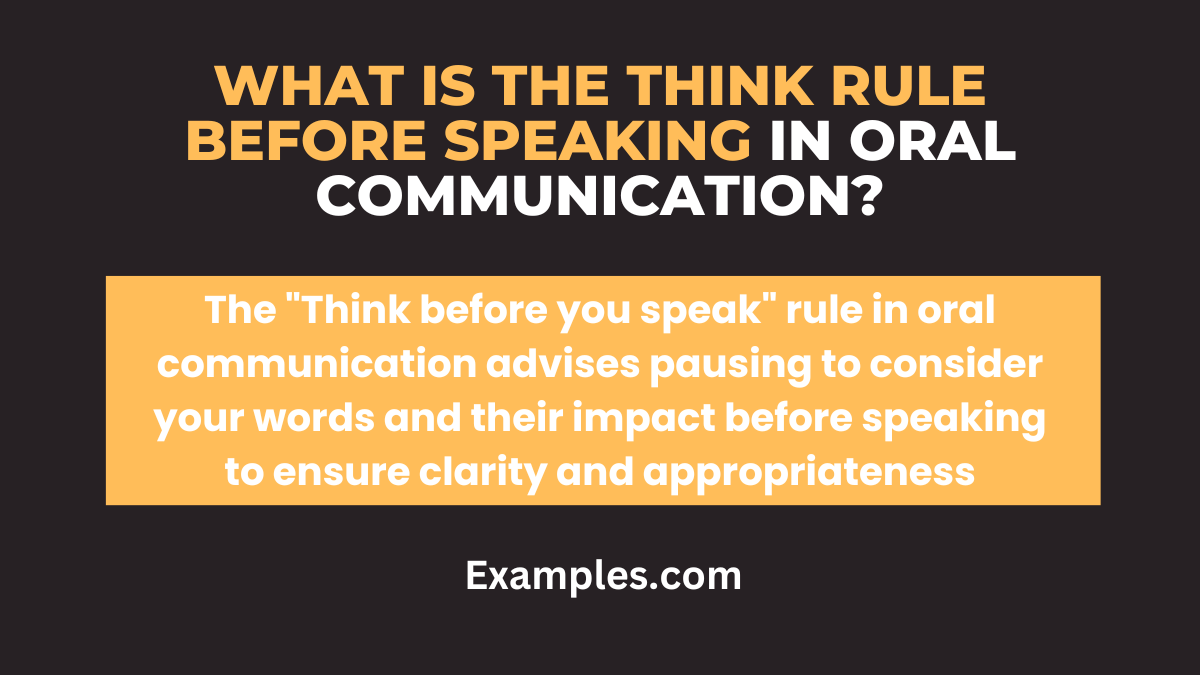29+ Think Before You Speak in Oral Communication Examples
Discover the power of thoughtful speech in our comprehensive guide to Think Before You Speak in Oral Communication. Emphasizing the importance of Feedback in Oral Communication, this guide offers practical advice to refine your speaking skills. Learn how to harness the power of words for more impactful and meaningful conversations. This resource is a must-read for anyone looking to enhance their oral communication abilities.
What is the Think Rule Before Speaking in Oral Communication?

In oral communication, the ‘Think Rule’ is a crucial guideline that prompts individuals to consider their words carefully before speaking. This rule emphasizes the importance of reflection and deliberation in communication, ensuring that the message conveyed is clear, appropriate, and effective. By adhering to this rule, speakers can avoid misunderstandings, strengthen their relationships, and enhance their credibility. It involves assessing the truthfulness, helpfulness, inspiration, necessity, and kindness of your intended message – a practice that aligns with active listening in Oral Communication and fosters a more mindful approach to speaking.
How Do You Think Ahead When Speaking in Oral Communication?
Thinking ahead in oral communication involves anticipating the potential impact of your words and planning your message accordingly. This foresight helps in constructing statements that are clear, relevant, and empathetic. To effectively think ahead, it’s essential to understand your audience, context, and the desired outcome of your conversation. This practice not only improves the quality of your communication but also aids in avoiding verbal missteps. Incorporating strategies like pausing to consider your response, focusing on clarity in Oral Communication, and predicting possible questions or reactions can significantly enhance your ability to think ahead in conversations.
30 Examples of Think Before You Speak in Oral Communication
In oral communication, the adage ‘think before you speak’ holds significant weight. This principle involves pausing to consider the impact of your words, the clarity of your message, and the appropriateness of your tone before expressing your thoughts. It’s a crucial element in maintaining effective communication and ensuring that your message is conveyed respectfully and accurately. This skill not only aids in preventing misunderstandings but also enhances the quality of interpersonal interactions.
Considering Context
Before responding in a meeting, think about the relevance of your point to the topic. “I will share my thoughts, ensuring they align with our discussion’s focus.”
Evaluating Impact
Pause to consider how your words might affect others. “I need to phrase my feedback in a way that is constructive and supportive.”
Avoiding Misinterpretation
Reflect on your choice of words to prevent misunderstandings. “I’ll choose my words carefully to avoid any potential confusion.”
Tailoring to Audience
Think about the background and understanding of your audience before speaking. “I must adjust my explanation to suit the technical knowledge of my listeners.”
Ensuring Clarity
Plan your statement to be clear and to the point. “I’ll structure my sentence to convey my message directly and succinctly.”
Reflecting on Tone
Consider the tone of your voice before responding, especially in sensitive situations. “My tone should be calm and understanding to facilitate a positive dialogue.”
Assessing the Need for Speech
Decide if speaking up adds value to the conversation. “I will speak only if my contribution is beneficial to the discussion.”
Preventing Conflict
Think about whether your words might unintentionally spark conflict. “I need to ensure my words are diplomatic and non-confrontational.”
Fact-Checking

Before making a claim, ensure its accuracy. “I should verify this information before mentioning it in the meeting.”
Respecting Confidentiality
Consider the appropriateness of sharing certain information. “This detail might be confidential, so I should not discuss it openly.”
Aligning with Goals
Reflect on how your words align with your personal or organizational goals. “My statement should support our overall objectives.”
Considering Different Perspectives
Think about how your words might be received by individuals with different viewpoints. “I will frame my statement to be inclusive of various perspectives.”
Avoiding Assumptions
Avoid making statements based on unverified assumptions. “I should not assume the reasons behind their decision without proper information.”
Balancing Honesty and Tact
Weigh the need for honesty against the potential impact of your words. “I will be honest, yet tactful, in expressing my opinion.”
Avoiding Over-generalization
Be specific and avoid making sweeping statements. “Instead of generalizing, I’ll provide specific examples.”
Respecting Cultural Sensitivities
Consider cultural differences before speaking. “I must ensure my words are culturally sensitive and respectful.”
Maintaining Positivity
Reflect on whether your words contribute to a positive environment. “I will phrase my feedback positively to encourage and uplift.”
Considering Timing
Think about the right moment to say something. “This isn’t the right time to bring up this issue; I’ll wait for a more appropriate moment.”
Avoiding Over-complication
Simplify complex ideas before speaking. “I’ll break down this concept into simpler terms for clarity.”
Reflecting on Personal Bias
Acknowledge and set aside personal biases before speaking. “I need to ensure my personal views do not cloud the objectivity of my statement.”
Prioritizing Listening
Decide if listening rather than speaking is more appropriate. “In this situation, active listening in Oral Communication is more beneficial than immediately responding.”
Acknowledging Emotions

Recognize your emotional state before speaking. “I’m feeling quite emotional; I’ll take a moment to compose myself before responding.”
Respecting Others’ Time
Think about the length of your response in respect of others’ time. “I’ll keep my response brief and concise in Oral Communication.”
Ensuring Relevance
Ensure your points are relevant to the current conversation. “My comments should directly relate to the topic at hand.”
Promoting Constructive Dialogue
Reflect on whether your words promote understanding and progress. “My aim is to contribute constructively to this conversation.”
Avoiding Jargon
Think about whether using technical terms is necessary. “I should avoid jargon to keep my message clear and accessible to all attendees.”
Expressing Gratitude

Consider expressing appreciation where appropriate. “I’ll start by thanking the team for their efforts before providing my input.”
Addressing Misconceptions
Think about whether your words correct any misconceptions. “I should clarify this point to prevent any misunderstandings.”
Encouraging Collaboration
Reflect on whether your statement fosters teamwork. “My words should encourage collaboration and collective problem-solving.”
Balancing Professionalism and Approachability
Find the right balance between being professional and relatable. “I’ll maintain a professional demeanor while being approachable in my communication.
Importance of Thinking Before You Speak in Oral Communication
- Prevents Miscommunication: Ensuring you understand your message fully before speaking reduces the risk of misinterpretation.
- Enhances Clarity: Allows you to choose the most effective words for your message, enhancing overall clarity.
- Builds Credibility: Speaking with thoughtfulness can establish you as a knowledgeable and trustworthy individual.
- Promotes Effective Decision Making: Reflecting on your words helps in making more informed and effective decisions.
- Improves Relationships: Thoughtful speaking prevents unintended offense, thereby strengthening personal and professional relationships.
- Encourages Active Listening: By thinking before speaking, you’re more likely to listen to others, fostering mutual understanding.
- Reduces Conflict: Careful consideration of words can prevent misunderstandings that might lead to conflicts.
- Supports Persuasion: Well-thought-out arguments are more convincing and persuasive.
- Increases Confidence: Knowing what you want to say and saying it effectively boosts self-confidence.
- Enhances Public Speaking Skills: Thoughtful speaking is a cornerstone of effective public speaking in Oral Communication.
Benefits of Thinking Before You Speak
- Better Understanding: Ensures your audience comprehends your message as intended.
- Enhanced Problem-Solving: Thoughtful speaking contributes to more effective problem-solving in discussions.
- Improved Listening Skills: Encourages you to become a better listener, a key component of active listening in Oral Communication.
- Stronger Arguments: Provides time to formulate stronger, more coherent arguments.
- Emotional Intelligence: Demonstrates maturity and emotional intelligence in handling sensitive topics.
- Respect from Others: Earns respect from peers and superiors for your thoughtful communication.
- Increased Influence: Thoughtful communication can enhance your influence in both personal and professional settings.
- Facilitates Leadership: Leaders who think before they speak are often more effective and admired.
- Promotes Patience: Encourages a more patient and considered approach to communication.
- Reduces Stress: Preventing misunderstandings can significantly reduce stress and anxiety in communication.
Tips to Think Before Speaking in Oral Communication
- Pause Before Responding: Take a moment to collect your thoughts before answering.
- Consider Your Audience: Tailor your message to be relevant and appropriate for your listeners.
- Reflect on Your Objective: Remind yourself of the goal of your communication.
- Organize Your Thoughts: Structure your thoughts to convey your message clearly.
- Choose Your Words Wisely: Select words that accurately convey your intended meaning.
- Practice Mindfulness: Be aware of your thoughts and feelings in the moment.
- Visualize Your Message: Mentally rehearse what you want to say before saying it.
- Evaluate Potential Impact: Consider how your words might affect the listener.
- Stay Calm and Composed: Maintain a calm demeanor to think more clearly.
- Seek Feedback: After speaking, ask for feedback to understand how your message was received.
In summarizing the importance of thinking before speaking in oral communication, it’s clear that this practice is more than just a measure of caution; it’s a fundamental aspect of effective, empathetic, and responsible communication. By pausing to consider our words, we not only prevent misunderstandings and conflicts but also foster an environment of respect and understanding. This approach is particularly important in diverse settings where cultural sensitivities and individual differences must be acknowledged. In the fast-paced world of digital communication, where words are often hastily typed and sent, the principle of thinking before speaking becomes even more crucial.
For further exploration of effective communication strategies in diverse environments, the Harvard Business Review offers insightful articles and resources. Their content provides valuable perspectives on communication in various professional contexts, including how to navigate complex conversations. Additionally, the Stanford Social Innovation Review is an excellent resource for understanding the role of communication in leadership and social change. Their articles offer a deep dive into how thoughtfully crafted communication can drive innovation and positive change in communities and organizations.



